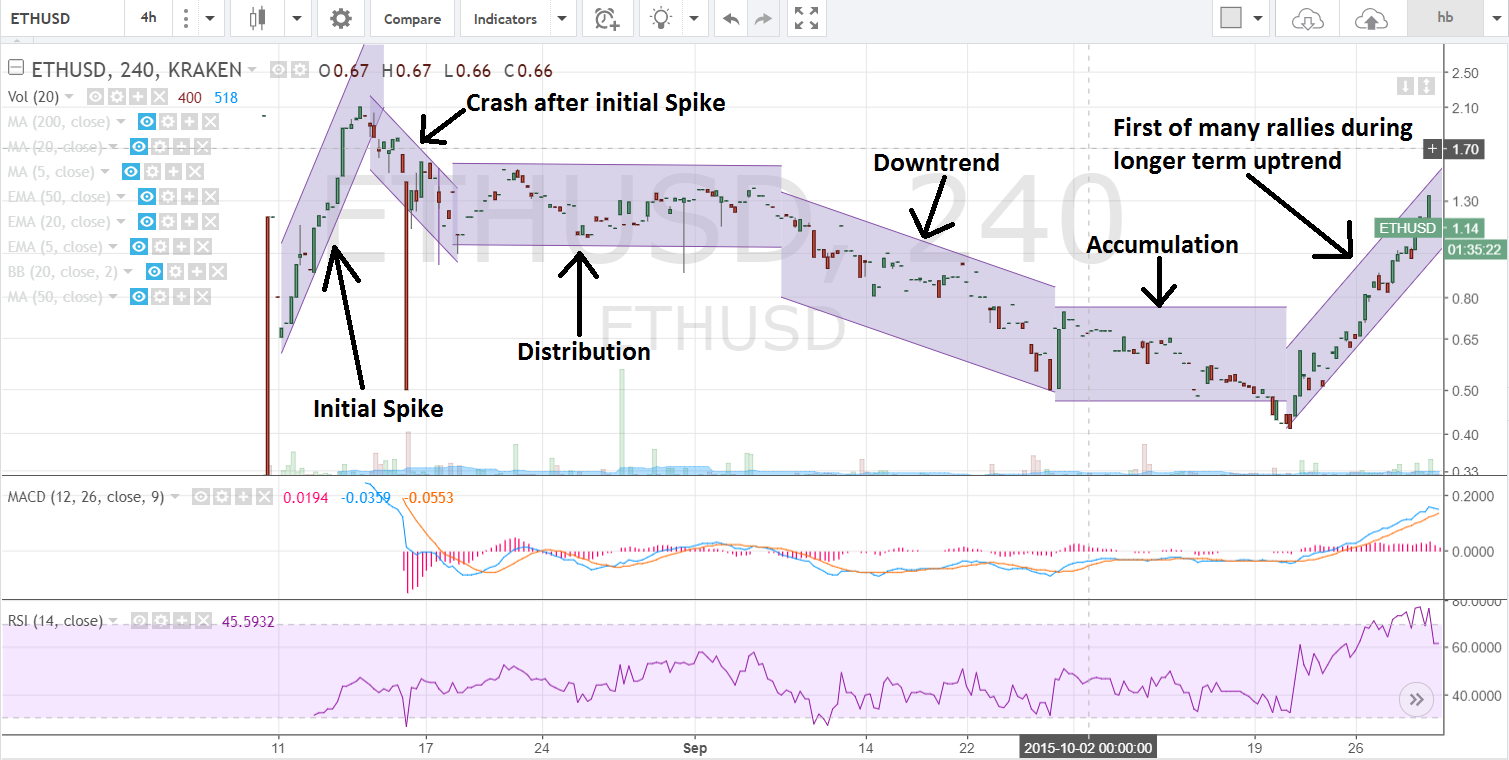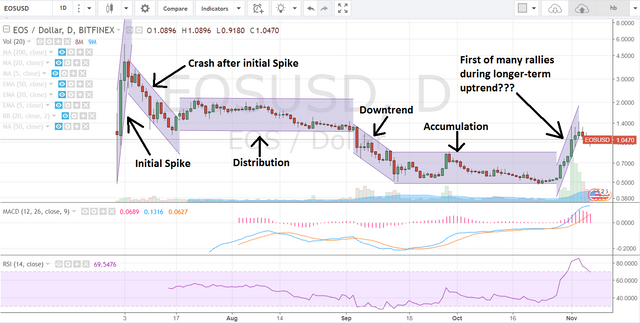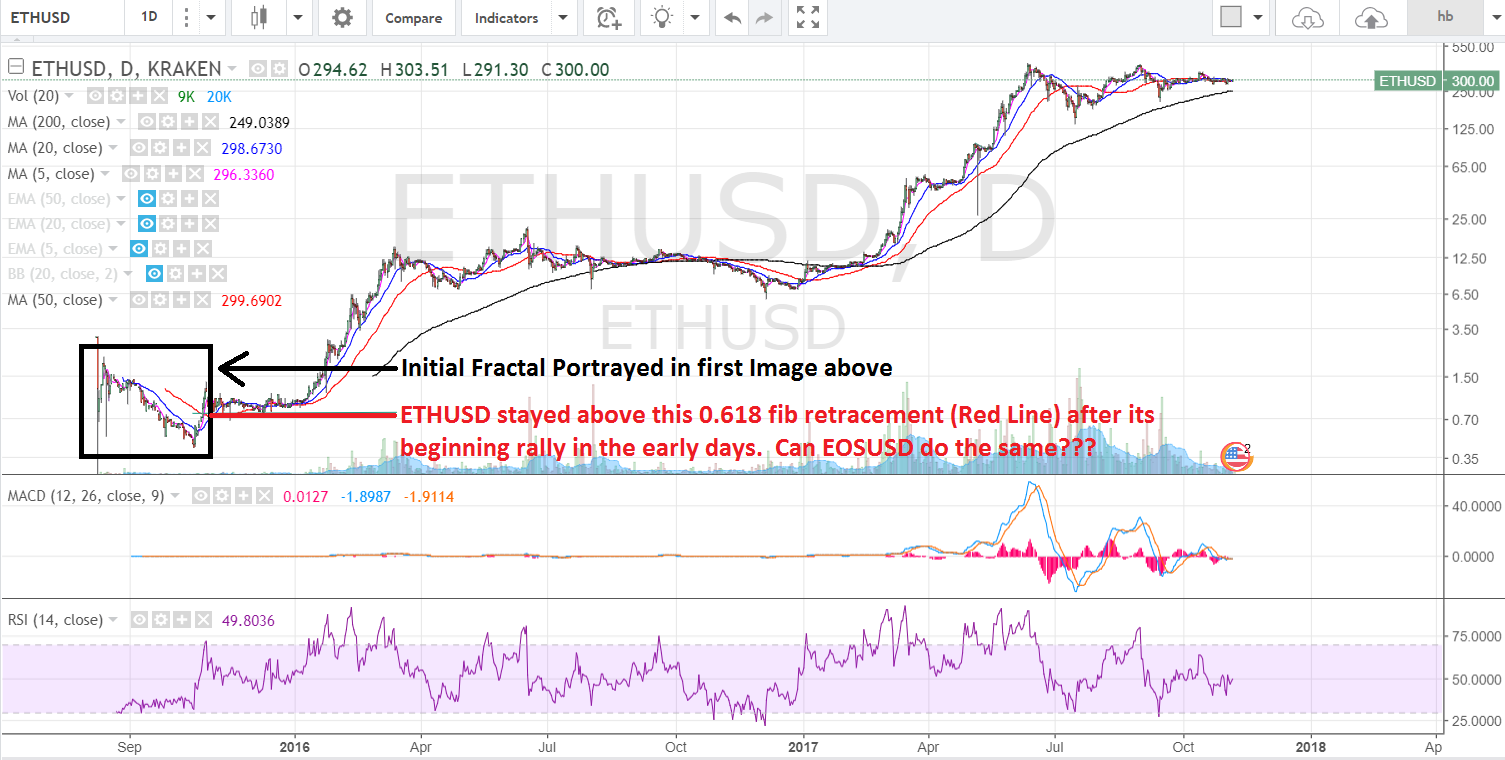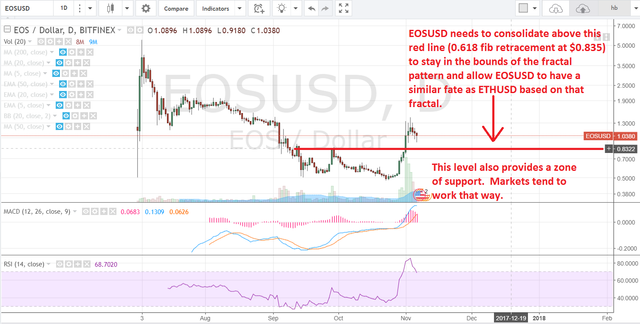The Big Long – Could EOS supplant ETH - Fractals and Fundamentals – 11/06/17
The first image is of ETHUSD from August 2015 to October 2015. The second image is of EOSUSD from July 2017 until now.
Here is what happened next to ETHUSD.
EOSUSD
Of course, the ETHUSD rise was in the context of an overall crypto bull market. During an overall bear market, EOS might not fare so well. Secondly, over 2,000,000 EOS tokens will be distributed every day until roughly June 2018. This could help to thwart any kind of significant rally.
EOS has a ton of talent and big names behind it with the potential to scale to millions of transactions per second. Dan Larimer has (hopefully) taken everything he has learned with bitshares, steem, and the Graphene toolkit in general, and translated that into a potentially powerhouse chain that can form the basis of the internet of value.
I have some reservations about EOS however. Mainly, DPOS is flawed in my opinion because there are no absolute penalties for validators, unlike the proposed Casper solution in Ethereum where validators directly lose all, or part of their deposits if they go against consensus. DPOS is very similar to corporate voting, which works well to a certain extent, but I believe this type of system will not be sufficient for a global internet of value, as gaming of the system will be prevalent and come with massive rewards for those who are successful. Hackers will try anything and everything to attack a gobal digital reserve currency.
I could be wrong about that. Public/Private key cryptography combined with the threat of users hard forking at will provides a vast portion of security and financial sovereignty. The only way to find out the true vulnerability of DPOS is to see if the system can be successfully attacked with valuations in the trillions of dollars. By that point, it may be too late to invest and expect anything other than a trivial return. Therefore, I hedge my bets and have bought into both ETH and EOS.
Vitalik Buterin best sums up the potential issues with EOS:
On "100k transactions per second!!1!1"
Dan's EOS achieves its high scalability by relying on a small number of what are essentially master nodes of a consortium chain, removing Merkle proofs and any other protections that would allow regular users to audit any part of the system's execution unless they want to personally run a full node themselves. See http://vitalik.ca/general/2017/05/08/coordination_problems.html for why I think this is undesirable.
On DPOS
To try to ensure decentralization, DPOS allows all coin holders to vote on who the nodes running the consortium chain are. This, together with the lack of in-protocol economic incentives for these master nodes to behave correctly, and the lack of client-side validation capability, mean that there is an extreme reliance on the voting mechanism. Voting has the following problems:
• Low voter participation (the DAO carbonvote, the current EIP186 carbonvote, the DAO proposal votes, and even Bitshares DPOS votes in 2014 all had <10% participation)
• Game-theoretic tragedy-of-the-commons vulnerabilities: because each voter only has a tiny chance of influencing the result, their incentive to vote correctly is thousands of times lower than the socially optimal incentive. This means that situations like everyone putting their coins on exchanges and exchanges voting on users' behalf, with users not really caring how exchanges vote with their money, are likely to happen.
• Coin holder interests are not perfectly aligned with user interests, and so proposals that increase coin prices at the expense of making the system useful may get implemented.
Basically, those arguing in favor of coin voting are arguing in favor of the same process as the DAO carbonvote deciding who runs the blockchain and all significant protocol decisions.
On fees
EOS has a mechanism where instead of having transaction fees, there is a rule that if you hold N tokens you can send a maximum of N * k transactions per period (see Steem whitepaper). This has quite an undesirable consequence for usability: it means that users have to buy N tokens, and have to be exposed to their volatility. This is especially bad for:
• The poor, who are not interested in putting the entirety of their often very low savings into a funky new cryptoasset in order to be able to use a blockchain.
• Anyone who wants to use the blockchain only a few times and then go away (they would need to buy coins and then sell them again)
• Anyone who experiences prolonged unexpected spikes in demand (ie. pretty much eveyone); users will have to buy enough coins to cover perhaps the 99th percentile of their expected usage, so that they don't get stuck being "out of gas" and having to go to an exchange.
In Ethereum the latter is also true to some extent, but because you have to pay fees, the values involved are much smaller, so buying an extra few dollars of ether just in case is not a big deal.
Disclaimer: None of this is advice of any kind.




100% behind you ! Great post
Hopefully the big names will choose either BTS or EOS to run their transactions. Like Amazon do 600 transactions per second so BTC and ETH are too slow.
This could be a huge opportunity to skyrocket the company =)
Good fractal work here.
I believe EOS has a good chance to repeat the path of ETH.
Thank you for parsing out the investment life cycle, for lack of a better term. I feel we can use that analysis to find other cryptos to invest in that turn out to trade that pattern as well.
Perhaps a select few. The vast majority will probably enter a death spiral, especially during the next crypto bear market.
Oh yes, I agree with that. We have already seen it with many alts. I look at cryptos like trading far out of the money options. You can buy them on the cheap and only need one out of many to work - that one usually equals a very favorable return.
Nice post, I also think EOS could be "as big" as ETH but it is too soon to tell. Nevertheless their team has some very brilliant developers and project managers.
Great to see that you also follow it quickly.
Take care.
Informative post
Me too .... I have a little Ethereum, EOS and IOTA